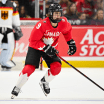WASHINGTON -- The Washington Capitals were eliminated from the Stanley Cup Playoffs by the New York Rangers with a 4-2 loss in Game 4 of the best-of-7 Eastern Conference First Round on Sunday. It was the first time Washington was swept in a first-round series in its 49-season history.
The Capitals (40-31-11) qualified for the playoffs as the second wild card from the East after missing the postseason last season for the first time since 2014. Washington has made the playoffs in 15 of Alex Ovechkin's 19 seasons but has not won a series since winning the Stanley Cup in 2018.
The skinny
Potential unrestricted free agents: Max Pacioretty, F; Nicolas Aube-Kubel, F; Joe Snively, F; Lucas Johansen, D
Potential restricted free agents: Connor McMichael, F; Beck Malenstyn, F; Matthew Phillips, F; Hardy Haman Aktell, D
Potential 2024 Draft picks: 8
Here are five reasons the Capitals were eliminated:
1. Rangers' superior depth
The Capitals overcame their lack of scoring depth and surprised many by qualifying for the playoffs, but were overmatched against the Rangers, who won the Presidents' Trophy by leading the NHL with a team-record 114 points (55-23-4). New York had 10 players score goals, including four with more than one, led by Vincent Trocheck's three. Washington had six players score a goal with defenseman Martin Fehervary being the only one to get two. McMichael and Hendrix Lapierre were the only Capitals forwards to score a goal 5-on-5. Ovechkin did not have a point in a playoff series for the first time in his NHL career.
The Capitals' offensive struggles carried over from the regular season, when they were 28th in the NHL with 2.63 goals per game. Ovechkin (31), Dylan Strome (27) and Anthony Mantha (20 before being traded to the Vegas Golden Knights on March 5) were Washington's only players to reach 20 goals. Strome (67), Ovechkin (65) and John Carlson (52) were the only ones to reach 40 points.
2. Special teams struggles
The Capitals hoped it to keep the games 5-on-5 as much as possible and it turned into a special teams series, which played to the Rangers' strengths. New York was 6-for-16 (37.5 percent) on the power play and scored two short-handed goals, which turned to be the winning goals in Games 2 and 3.
The Capitals were 2-for-17 (11.8 percent) with the man-advantage, with both goals coming in Game 2, and allowed those two backbreaking short-handed goals. Washington had the top-ranked power play in the NHL after Jan. 26 (29.3 percent), but struggled against New York's penalty kill, which was third in the League (84.5 percent).



















